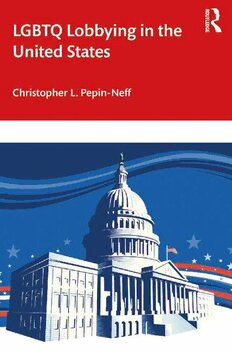
LGBTQ Lobbying in the United States PDF
Preview LGBTQ Lobbying in the United States
LGBTQ LOBBYING IN THE UNITED STATES LGBTQ Lobbying in the United States argues that the issues and tactics prioritized by the mainstream gay lobbying community fail to serve LGBTQ interests and are complicit in perpetuating heteronormative power dynamics and institutions that render queer and trans people vulnerable to structural oppression. The book posits that there are different LGBTQ lobbying communities— a dominant gay mainstream lobbying category, whose work advances heteronormative ideals, and a second category of LGBTQ lobbying that is intersectional and challenges hegemonic heterosexual institutions. Analysis in the book builds on existing public policy literature and is aided by the author’s practitioner experience in lobbying for LGBTQ issues in Washington, D.C. over the past 20 years. This book is suitable as a textbook for students and researchers in LGBTQ studies, U.S. politics, and gender studies. The book will also appeal to activists and professionals in political lobbying. Christopher L. Pepin- Neff is a Senior Lecturer in Public Policy at the University of Sydney. His research focuses on emotional policymaking and LGBTQ politics. He was the first full- time lobbyist for the repeal of “don’t ask, don’t tell” and founder of Q Street, the LGBTQ lobbying association of Washington, D.C. He lives and works in both Burlington, Vermont, and Sydney, Australia. LGBTQ LOBBYING IN THE UNITED STATES Christopher L. Pepin- Neff First published 2021 by Routledge 2 Park Square, Milton Park, Abingdon, Oxon OX14 4RN and by Routledge 605 Third Avenue, New York, NY 10158 Routledge is an imprint of the Taylor & Francis Group, an informa business © 2021 Christopher L. Pepin- Neff The right of Christopher L. Pepin- Neff to be identified as author of this work has been asserted by him in accordance with sections 77 and 78 of the Copyright, Designs and Patents Act 1988. All rights reserved. No part of this book may be reprinted or reproduced or utilised in any form or by any electronic, mechanical, or other means, now known or hereafter invented, including photocopying and recording, or in any information storage or retrieval system, without permission in writing from the publishers. Trademark notice: Product or corporate names may be trademarks or registered trademarks, and are used only for identification and explanation without intent to infringe. British Library Cataloguing- in- Publication Data A catalogue record for this book is available from the British Library Library of Congress Cataloging- in- Publication Data Names: Pepin-Neff, Christopher L., author. Title: LGBTQ lobbying in the United States / Christopher L. Pepin-Neff. Other titles: Lesbian, gay, bisexual, transgender, queer lobbying in the United States Description: Milton Park, Abingdon, Oxon; New York, NY: Routledge, 2021. Includes bibliographical references and index. Identifiers: LCCN 2020055394 (print) | LCCN 2020055395 (ebook) | Subjects: LCSH: Sexual minorities–Political activity–United States. | Lobbying–United States. Classification: LCC HQ73.73.U6 P47 2021 (print) | LCC HQ73.73.U6 (ebook) | DDC 306.760973–dc23 LC record available at https://lccn.loc.gov/2020055394 LC ebook record available at https://lccn.loc.gov/2020055395 ISBN: 978-0-367-77223-9 (hbk) ISBN: 978-0 -3 67-7 7222- 2 (pbk) ISBN: 978-1-003-17033-4 (ebk) Typeset in Bembo by Newgen Publishing UK For Larry Kramer (1935– 2020) CONTENTS List of Illustrations viii Preface ix Acknowledgments xi 1 LGBTQ lobbying 1 2 LGBTQ lobbying framework 26 3 LGBTQ lobbying tactics 51 4 The White House and LGBTQ lobbying 75 5 The Congress and LGBTQ lobbying 104 6 Sex and LGBTQ lobbying 124 7 The Human Rights Campaign and LGBTQ lobbying 153 8 Conclusion: the future of LGBTQ lobbying 186 Index 207 ILLUSTRATIONS Figures 2.1 Categories of lobbying 39 4.1 White House: Pennsylvania Ave. front entrance 85 4.2 White House: West Wing entrance 86 4.3 White House: Entering the White House grounds (Penn. Ave.) 86 5.1 Policy actions at SLDN 105 8.1 First Q Street logo 189 Tables 3.1 Categories of lobbying tactics 56 3.2 Comparison of tactics across movements 67 5.1 Categories of legislative LGBTQ lobbying 106 5.2 Comparison of “don’t ask, don’t tell” talking points 115 5.3 Senate analysis of “don’t ask, don’t tell” repeal vote 116 5.4 2005 SLDN Senate “don’t ask, don’t tell” vote count 121 7.1 The Human Rights Campaign in the categories of lobbying 154 7.2 Lobbying expenditures to Thorsen French Advocacy LLC 162 8.1 Leading Annual Pride attendance by city 199 PREFACE The most consequential event in the history of LGBTQ lobbying is the Government assassination of hundreds of thousands of people who had HIV/ AIDS in the 1980s and 1990s. This killing continues every day as Black MSM are denied access to affordable PrEP. An engagement on the topic of LGBTQ lobbying in the United States must contend with the immovable tragedy that is HIV/ AIDS. Lobbying by the LGBTQ community is more about the people who are not here, than the people who are here. Many of the best and brightest, many of the youngest, poorest, smartest, and most marginalized were left to die through Government and public indifference. Many Black and Brown activists. And students. And teenagers that were fighting for the chance to live. They all died. Thus, the titanic toll on LGBTQ people and the debt owed to those who died building the advocacy community is unrepayable. Specifically, the HIV/ AIDS political assassinations, where LGBTQ lobbyists and activists were murdered by the affirmative and knowing neglect and negli- gence of the Reagan- Bush Governments and associated agencies, killing hundreds of thousands of people between the early 1980s and mid- 1990s. This was violence. Judith Butler summaries violence this way: Michel Foucault distinguished between forms of sovereign violence, whereby a king, a monarch, or someone vested with a sovereign power, decides who should live and who should die. And there’s a form of violence that he called biopolitical and that Cameroonian philosopher Achille Mbembe calls necropolitics: violence that leaves a set of people to die, abandons them to death, or refuses to offer the assistance that is necessary in order to save their lives. (Terry & Butler, 2020)
